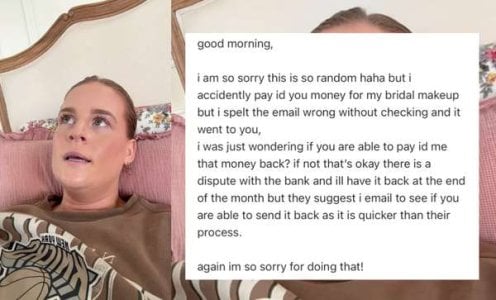Free money? Not quite—here’s why a random $350 deposit could be a red flag
- Replies 0
Imagine this: you’re making your morning cuppa, scrolling through your bank app, and suddenly—what’s this?
An extra $350 has magically appeared in your account.
No Lotto win, no forgotten birthday, just a mysterious deposit from someone you don’t know. Before you start planning a cheeky treat for yourself, it’s time to hit pause—because this 'free money' could be the start of a very expensive headache.
That’s exactly what happened to Molly Smith, a South Australian mum and content creator, who recently found herself $350 richer for no apparent reason.
The payment came from a woman named Phoebe, with the description 'for wedding.'
‘My first thought was that it was a job I had completed, and my payment had come through. But I’m pretty on top of my finances and knew that figure wasn’t expected,’ she said.
Curious (and a bit concerned), Molly tried to track down Phoebe on social media, but with only a first name, it was like searching for a needle in a haystack.

Then, she spotted an email in her spam folder from Phoebe, explaining the money was meant for a makeup artist. The email’s grammar was a bit off, which only made Molly more suspicious. She tried calling Phoebe twice, but both calls went straight to voicemail.
With no clear answers, Molly decided to wait and see if her bank would automatically reverse the payment.
But as the weekend ticked by, she worried about how long it might take for the bank to sort things out—especially if someone was relying on that money for their big day.
Then, the plot thickened: Molly received a message from a makeup artist who, coincidentally, shared her name.
The artist explained the mix-up—Phoebe had sent the money to the wrong Molly, and had gone off the grid because she was busy getting married! With the mystery solved, Molly transferred the money back herself.
All’s well that ends well, right? Not so fast. While Molly’s story had a happy ending, cybersecurity expert Simon Smith warns that not all surprise deposits are so innocent.
In fact, this scenario has all the hallmarks of a 'recall scam'—a sneaky trick that’s catching out Aussies across the country.
‘This works by the scammer depositing funds into the victim's bank account, then contacting the victim claiming it was an accident or a payment intended for someone else,’ Smith shared. ‘The scammer pressures the victim to manually transfer the money back.’
‘In reality, the money was sent by another scam victim who was instructed by the scammer to deposit funds into your account.’
A few weeks later, the real victim realises they’ve been scammed and asks their bank to recall the payment.
The bank then debits your account for the same amount you already sent to the scammer, leaving you out of pocket—sometimes twice over.
‘Often scammers pay into a bank account a small amount to establish a false trading relationship with their victim,’ he said.
Source: @meet.the.mackenzie / Tiktok.
‘This falsely makes the bank think that they are a known party. Then when the victim is instructed to send much higher amounts back to an account under various scam scenarios, this false trust allows those payments to go through without triggering bank fraud systems.’
If you ever find a mystery deposit in your account, don’t rush to send it back—no matter how convincing the story. Here’s what you should do:
Read more: After Louis lost $109k to scammers, banks are finally combatting the 'flaw' the scammers used

Have you ever received a surprise payment or been contacted by someone asking for money back? Did you spot the scam, or did you nearly fall for it? Share your stories and tips in the comments below!
An extra $350 has magically appeared in your account.
No Lotto win, no forgotten birthday, just a mysterious deposit from someone you don’t know. Before you start planning a cheeky treat for yourself, it’s time to hit pause—because this 'free money' could be the start of a very expensive headache.
That’s exactly what happened to Molly Smith, a South Australian mum and content creator, who recently found herself $350 richer for no apparent reason.
The payment came from a woman named Phoebe, with the description 'for wedding.'
‘My first thought was that it was a job I had completed, and my payment had come through. But I’m pretty on top of my finances and knew that figure wasn’t expected,’ she said.
Curious (and a bit concerned), Molly tried to track down Phoebe on social media, but with only a first name, it was like searching for a needle in a haystack.

Australians are being warned to be cautious if they receive unexpected payments in their bank accounts, as these could be linked to potential scams. Image source: @meet.the.mackenzies / Tiktok.
Then, she spotted an email in her spam folder from Phoebe, explaining the money was meant for a makeup artist. The email’s grammar was a bit off, which only made Molly more suspicious. She tried calling Phoebe twice, but both calls went straight to voicemail.
With no clear answers, Molly decided to wait and see if her bank would automatically reverse the payment.
But as the weekend ticked by, she worried about how long it might take for the bank to sort things out—especially if someone was relying on that money for their big day.
Then, the plot thickened: Molly received a message from a makeup artist who, coincidentally, shared her name.
The artist explained the mix-up—Phoebe had sent the money to the wrong Molly, and had gone off the grid because she was busy getting married! With the mystery solved, Molly transferred the money back herself.
All’s well that ends well, right? Not so fast. While Molly’s story had a happy ending, cybersecurity expert Simon Smith warns that not all surprise deposits are so innocent.
In fact, this scenario has all the hallmarks of a 'recall scam'—a sneaky trick that’s catching out Aussies across the country.
‘This works by the scammer depositing funds into the victim's bank account, then contacting the victim claiming it was an accident or a payment intended for someone else,’ Smith shared. ‘The scammer pressures the victim to manually transfer the money back.’
‘In reality, the money was sent by another scam victim who was instructed by the scammer to deposit funds into your account.’
A few weeks later, the real victim realises they’ve been scammed and asks their bank to recall the payment.
The bank then debits your account for the same amount you already sent to the scammer, leaving you out of pocket—sometimes twice over.
‘Often scammers pay into a bank account a small amount to establish a false trading relationship with their victim,’ he said.
Source: @meet.the.mackenzie / Tiktok.
‘This falsely makes the bank think that they are a known party. Then when the victim is instructed to send much higher amounts back to an account under various scam scenarios, this false trust allows those payments to go through without triggering bank fraud systems.’
If you ever find a mystery deposit in your account, don’t rush to send it back—no matter how convincing the story. Here’s what you should do:
- Contact your bank immediately: Let them know about the unexpected payment. They can investigate and advise you on the safest course of action.
- Don’t transfer the money yourself: Even if someone contacts you with a heartfelt plea, don’t send the money back directly. If it’s a genuine mistake, the bank can reverse the transaction safely.
- Be wary of unusual communication: Scammers often use poor grammar, odd email addresses, or pressure tactics. If anything feels off, trust your instincts.
- Keep records: Save any emails, texts, or messages you receive about the payment. This can help your bank or the police if things go south.
Read more: After Louis lost $109k to scammers, banks are finally combatting the 'flaw' the scammers used
Key Takeaways
- Australians are being warned to be cautious if they receive unexpected payments in their bank accounts, as these could be linked to potential scams.
- A South Australian woman, Molly Smith, received a random $350 payment labelled for a wedding, which led to confusion and concern about its legitimacy.
- Cybersecurity experts say that scammers may use tactics like 'recall scams', where victims are pressured to return funds that actually originated from another scam victim, risking a double loss when the bank recalls the initial payment.
- If you receive an unexplained payment, it's advised not to transfer the money back yourself; instead, contact your bank for guidance to avoid being caught out by a scam.
Have you ever received a surprise payment or been contacted by someone asking for money back? Did you spot the scam, or did you nearly fall for it? Share your stories and tips in the comments below!







